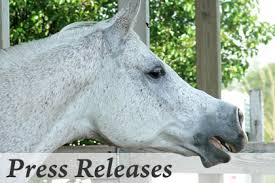Standing CT for Horses, Developed at UW-Madison, Fills Longstanding Need in Veterinary Medicine
September 26, 2019 —At California’s Santa Anita Park, in a single season, nearly 30 horses lost their lives during racing or training, some due to injury. This prompted the temporary closure of the prominent horse racing course in the summer of 2019.
This and other instances of catastrophic injuries in racehorses have recently drawn critical attention to the sport. As the industry searches for solutions, scientists at the University of Wisconsin–Madison have created a diagnostic imaging tool that could help prevent these injuries through early detection and monitoring: a standing helical computed tomography (CT) scanner named Equina.
It is the first CT scanner on the market to vertically scan the lower legs of a standing, sedated horse and also the first dual-purpose standing CT machine. This means it can scan up and down a patient’s legs and move horizontally to scan the head and neck – three areas of the body where CT is advantageous in teasing out anatomical intricacies.
The system fills a longstanding, unmet need in the diagnosis and treatment of a variety of conditions facing horses and other large animals. Already, more than 150 horses ranging in size from a miniature horse to a draft horse have been scanned at UW Veterinary Care, the teaching hospital of the UW–Madison School of Veterinary Medicine (SVM), using the new system. This has led to findings undetectable by earlier methods, including a brain tumor, an orbital tumor behind the eye, and diseases of the feet, teeth and sinuses
Create a free account with TheHorse.com to view this content.
TheHorse.com is home to thousands of free articles about horse health care. In order to access some of our exclusive free content, you must be signed into TheHorse.com.
Start your free account today!
Already have an account?
and continue reading.
Written by:
Press Release
Related Articles
Stay on top of the most recent Horse Health news with













